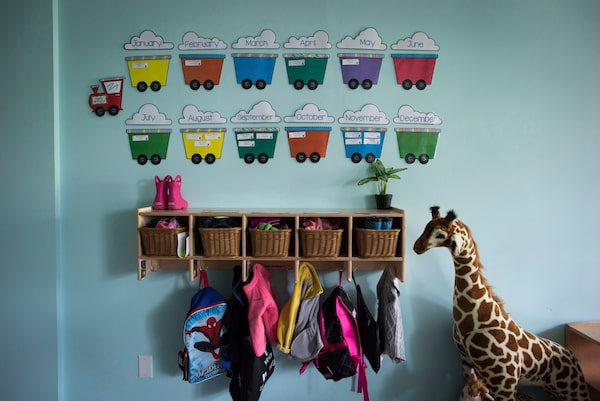
Children's backpacks and shoes at a CEFA (Core Education and Fine Arts) Early Learning daycare franchise, in Langley, B.C., in 2018.DARRYL DYCK/The Canadian Press
The federal government plans to strike individual deals with each province and territory as part of a national child-care program and Finance Minister Chrystia Freeland said provincial contributions will vary based on the level of service they are already providing.
Speaking with reporters Tuesday, Ms. Freeland said Ottawa is open to hearing from provinces about their needs, but the talks will focus on the specific service goals outlined in the federal budget released Monday.
“Although Canada is very, very diverse in the provision of early learning and child care – and pretty much everything else – our goals are now national,” she said at a news conference with Prime Minster Justin Trudeau.
“And what we’re saying is every Canadian parent, five years from now, everywhere in the country, should have access to affordable, high-quality, early learning and child care for an average of $10 a day,” she said.
The budget announced $30-billion over five years in new funding for child care and a pledge to provide annual child-care transfer funding worth $8.3-billion beyond the initial five years. The plan for subsidized care is inspired by a model in Quebec, where parents can access spaces at a cost of $8.35 per day. Ms. Freeland declined to comment on how she expects the talks to go with each province, but said some discussion has already taken place.
“The arrangement with each province and territory is going to depend on the bilateral negotiation and it will vary from province and territory,” Ms. Freeland said when asked how much each province is expected to contribute.
The budget said the goal is for the program’s cost to be split evenly between Ottawa and the provinces.
Meanwhile, reaction from the provinces was mixed, with some welcoming the announcement, and others concerned about a standardized approach.
Alberta Minister of Children’s Services Rebecca Schulz said she looks forward to negotiating with the federal government to ensure there’s “flexibility” for Alberta child care operators and parents.
“We’ve often said that we’re not really interested in a one size fits all, more institutionalized approach, to child care across the country,” she said. Ms. Schulz said Alberta has a mixed system of non-profit and private centres and fewer than one in seven parents are using licensed child-care centres currently.
Ontario Minister of Education Stephen Lecce said the province needs long-term financial support that is flexible, “not a one-size fits all approach.”
“We are prepared to work with all levels of government on providing families with safe, affordable, and flexible child-care options to ensure parents can access child care in their communities that meets their needs.”
Nova Scotia Premier Iain Rankin called the proposal the “highlight” of the budget, saying he believes it is very substantial.
Quebec Finance Minister Eric Girard said he is pleased to see the leadership of his province recognized, and that he is expecting it to receive funding without conditions. He said he understands that Quebec was the inspiration for the program, and so it will be a transfer without conditions. He said Quebec is expecting to recoup $6-billion over five years.
Northwest Territories Premier Caroline Cochrane said although she is grateful for the new funding, she hopes to see spending on creating more child-care centres in the territory, and that she stressed to Ms. Freeland the need to have “flexibility” within the funding.
Linda White, political science professor at the University of Toronto and RBC chair in economic and public policy, said she believes co-operation is possible between the governments.
“I’m fairly optimistic that it would be difficult for provincial premiers to turn down the size of the envelope that they’re proposing,” Prof. White said.
Susan Prentice, sociology professor at the University of Manitoba, said although the promise to create a national child-care program is decades old, she has hope this time will be different.
“My read is that we’re over a tipping point, that there’s been a kind of a paradigm shift in Canadian political thinking, and that the case for child care has been made, heard and answered,” she said.
While many advocacy groups applauded the proposal, faith-based think tank Cardus criticized the plan, with senior fellow Andrea Mrozek, calling it “inequitable” because it only funds one type of child care.
“I just don’t view this as feminism understood properly, it should allow women more choices and I don’t see that this is happening in this particular move,” she said.
Ms. Mrozek said her organization has advocated for enhancing the Canada Child Benefit, and it would also like to see the federal government create a refundable credit for child-care expenses, extended and improved access to parental leave and flexibility to allow provinces to decide how to use the funding.
Know what is happening in the halls of power with the day’s top political headlines and commentary as selected by Globe editors (subscribers only). Sign up today.
 Janice Dickson
Janice Dickson Bill Curry
Bill Curry